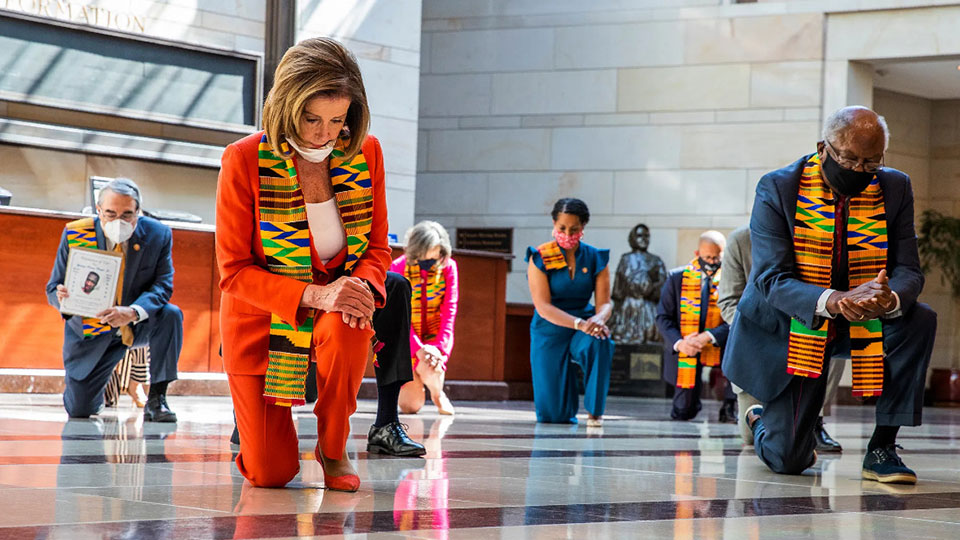
WASHINGTON—Responding to the mass movement for comprehensive change in the nation’s police departments – which itself is just one facet of the wider movement against racism in the U.S. – Congressional Democrats have unveiled a massive package of police reforms.
The lawmakers flew into D.C., despite the coronavirus pandemic, to showcase the Justice in Policing Act. And they challenged their congressional GOP colleagues to act, too – a challenge most Republicans have so far rejected.
The legislation, being crafted by the Congressional Black Caucus, outlaws chokeholds and similar physical uses of force by cops, such as the full-weighted fatal knee to the throat of unresisting prone African-American man George Floyd, 46, by Minneapolis police officer Derek Chauvin on May 25.
The measure also bans no-knock warrants in drug raids, like the raid – to the wrong address – where Louisville, Ky., police shot dead sleeping EMT Breonna Taylor, 26, with eight bullets.
Other provisions include:
- Ordering police officers to use deadly force only as a last resort and use de-escalation techniques.
- Ending the militarization of police, a program which let the Defense Department funnel billions of dollars’ worth of excess – and lethal – military equipment to local forces nationwide. It resulted in such images as police riding in armored troop carriers in San Diego.
- Ordering police departments to send data on use of force to a new federal databank, while the feds would also establish grants to state attorneys general for independent processes to investigate police misconduct and/or excessive use of force.
- Crafting ways to make it easier for people to sue police departments for damages for civil rights violations.
“The martyrdom of George Floyd gave the American experience a moment of national anguish as we grieve for the Black Americans killed by police brutality today,” House Speaker Nancy Pelosi, D-Calif., said at the press conference announcing the legislation.
“This moment of national anguish is being transformed into a movement of national action as Americans from across the country peacefully protest to demand an end to injustice. Today, the Congress is standing with those fighting for justice and taking action” against unjust policing.
That “taking action” last week included Philadelphia removing the statue of former Mayor and Police Commissioner Frank Rizzo from a plaza in front of the Municipal Services Building. Rizzo was known for both his open racism and his police force’s brutality.
Former Vice President Joe Biden, the Democratic party’s presidential nominee against Trump this year and a Rizzo critic for 45 years according to news files, praised the removal. “Frank Rizzo should have never had a statue in his honor in the first place,” Biden said on June 7 before flying to Houston to meet with Floyd’s family prior to his funeral there.
And on June 8, a majority of the Minneapolis City Council committed to completely defunding the current city police department. The vote is expected soon.
“We feel” the measure “will transform the relationships our communities have with the police,” said CBC Co-Chair Rep. Karen Bass, D-Calif., who represents inner-city Los Angeles. But Bass, the act’s author, and other lawmakers also admitted state and local officials – mayors, city councils, police chiefs among them – must play a big role.
“I would suggest to any local, state, and federal official that sometimes we have to follow the wishes of Americans. I have seen millions who have said ‘We have been treated unjustly,’” added Rep. Lacy Clay, D-Mo., whose district is centered on St. Louis.
“America is great because it is able to repair its faults,” said Rep. Hank Johnson, D-Ga., quoting Alexis de Tocqueville’s Democracy in America. “We have unveiled faults in our health care system,” the outsize illness and death rates among people of color from the coronavirus pandemic.
“We have unveiled faults in our criminal justice system” with the millions of people marching in protest of police racism in general and the murders of Floyd, Taylor, and others, Johnson added.
“And I’m sure the law-and-order message the president is spewing out there will not be successful,” Bass added of the Republican opposition.
Public opinion polls show that, at least for now, Bass, Clay, and their colleagues are right. More than 80% of respondents, including a majority of rank-and-file Republicans, support changing the culture of policing and transforming police relationships with people of color, and not just with African Americans. At the end of the hour-long press conference, Bass noted police have also oppressed Latinx and Native American people.
Whether Congressional Republicans will pay attention, though, is doubtful. House Minority Leader Kevin McCarthy, R-Calif., retweeted a Trump tweet: RT @RealDonaldTrump LAW & ORDER, NOT DEFUND AND ABOLISH THE POLICE. The Radical Left Democrats have gone Crazy!”
House Majority Leader Steny Hoyer, D-Md., shot back that Pelosi and he will call the House into session “as soon as it” – the legislation – “is ready.” But Hoyer also blasted the Senate GOP majority for refusing to approve the prior House-passed Emmett Till Anti-Lynching Act, named for the black youth from Chicago lynched in Mississippi for allegedly whistling at a white woman in 1955.
The Democrats’ legislation would also create a training program for police to deal with racial bias and duty to intervene. Experts are split over whether such anti-bias programs work, with some saying their impact quickly wears off under pressure from veteran police officers used to having their way on the streets.

MOST POPULAR TODAY


Zionist organizations leading campaign to stop ceasefire resolutions in D.C. area

Communist Karol Cariola elected president of Chile’s legislature

Afghanistan’s socialist years: The promising future killed off by U.S. imperialism

‘Pender Denton—Outlaw’: An affecting, understated Old West gay love story






Comments